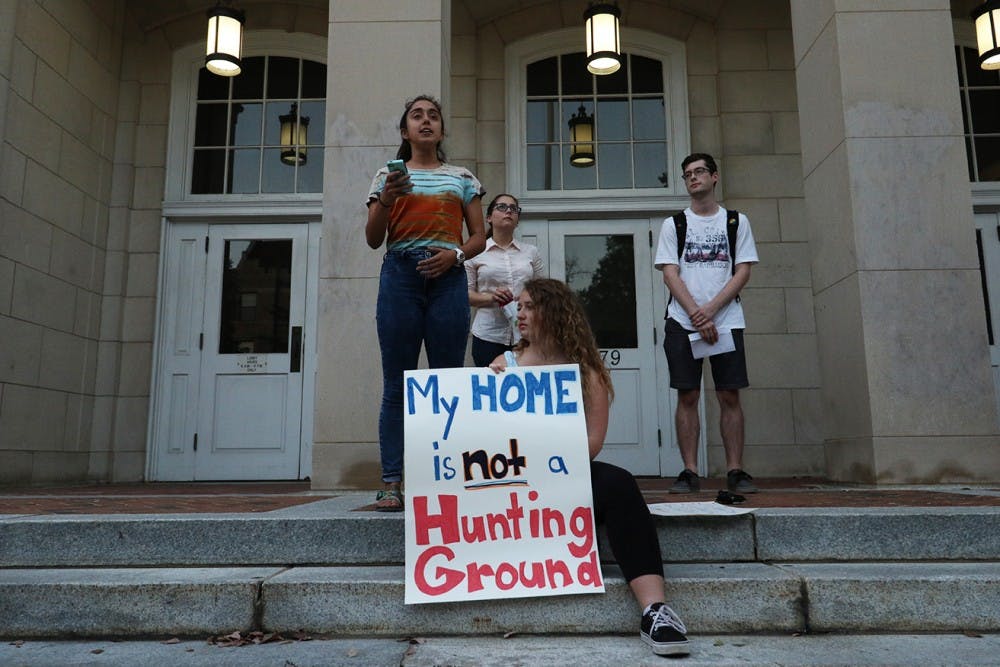After the University’s disastrous plan to cancel in-person classes, the overarching sentiment from off-campus voices has been: “Could anyone have expected this?”
Here’s the short answer: of course we could.
There was already a public health emergency on campus — and it’s woven into Carolina’s 231-year history. Sexual assault is rampant at UNC. University administration failed to comply with the Clery Act. Students like Faith Hedgepeth and Suellen Evans were sexually assaulted and murdered, and there still has not been any restorative justice. And with the recent release of sexual assault disciplinary records, coalesced with a time of chaos and confusion, it’s easy to forget about UNC’s poor record of handling crises.
Sexual assault is not an idiosyncratic issue to Carolina — but it is certainly an extremely intense one. In data released by the 2019 AAU Campus Climate Survey, more than a third of undergraduate women said they were sexually assaulted while at UNC — and the number rises to nearly half for those in their fourth year or higher. Women make up around 60 percent of undergraduate enrollment. When 1 in 6 people suffer from a debilitating illness, it is considered an epidemic. But when it comes to sexual assault, UNC does not consider it a matter of urgency.
These numbers come as no surprise to me, as someone who has spent my undergraduate career in a whirlwind of anxiety. My fear has manifested itself in tiny ways: I walk back to my dorm with my keys between my knuckles each night. I always wear shoes I can run in. I even resigned from my former position at The Daily Tar Heel — as a reporter on the Arts & Culture desk my freshman year — because I was too afraid to walk from Franklin Street to Craige Residence Hall alone in the dark each week. Before I even arrived on campus, I heard the whisperings from student activists and organizers: sexual assault was a deeply embedded problem, spread out so thinly across the UNC System it rendered itself opaque.
It doesn’t help that the rhetoric used by UNC's administration in the wake of COVID-19 is an eerie, funhouse mirroring of their rhetoric around sexual assault on campus. In October 2019, Chancellor Kevin Guskiewicz wrote in a message to the campus community: “These behaviors have profound physical and emotional effects on the people who experience them and also have lasting impacts on other members of the campus community. And while many of you have been very active in raising awareness and staying engaged in the issue, we need the help of every person — now more than ever — to change our culture.”
The emphasis is not on the administration’s shortcomings — instead, it asks for the student body to do the work necessary to end campus sexual assault. Not dissimilarly, UNC administration has increasingly pushed the narrative that students are wholly to blame for the rising amount of COVID-19 cases on campus; such as in the case of UNC System President Peter Hans, who released a public statement on August 20 suggesting that a “very small number of students behaving irresponsibly off campus" were to blame for the University’s move to remote instruction. That is their common thread: COVID-19 and sexual assault are not taken seriously, blamed on students and handled poorly (or not at all) by UNC’s higher administration.
The confluences do not stop there: sexual assault and COVID-19 are both crises that disproportionately affect LGBTQ+ and people of color, too. These emergencies are not monolithic. They require a holistic approach, one that includes establishing an interpersonal and sexual violence center; updates to the University’s required sexual assault module, SHARE, that acknowledge sexual assault from a minority and LGBTQ+ lens; and a cooperative safety commission that is not in the hands of the police, whose rape kits in the Triangle routinely go untested, to name a few strategies.
In order to successfully confront both COVID-19 and sexual assault on campus, the University must first admit their culpability. The argument that sexual assault on campus only occurs because of the choices of individual students is a flawed one; it ignores the University’s overarching power structure, which hinges on silence and complicity, and keeps victims in the dark. Likewise, the argument that COVID-19-positive students have contracted the virus out of their own accord is a flawed idea, too; it ignores UNC’s glaring structural problems, which have tangled student safety, security and health into a Gordian knot.




